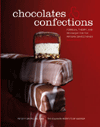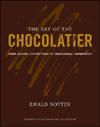‘Unjunking’ confections
Industry veteran Chris Mattina joins a group of “Unrealists” in launching a line of confections that reduces fat, calories and contains no artificial colors or flavors.
















There’s a Nigerian proverb that states it takes a whole village to raise a child, the idea being that it’s a communal effort shared by an extended family. With the launch of Unreal’s line of confections, it seems that Nicky Bronner, son of Unreal founder Michael Bronner, has given that proverb a new twist: It takes a whole child to change an industry.
As Chris Mattina, senior vice president for Unreal Brands, relates, it was Nicky that pushed his father into considering and then developing a company that would “unjunk” food, beginning with confections. It all began two years ago when 13-year-old Nicky returned home from Halloween with a hefty bag of candies, a sacred American tradition if there ever was one.
After Nicky went to bed, his dad, Michael, put most of it in the trash. When Nicky woke up and discovered most of the candy gone, an argument ensued between father and son. Convinced his father was being unreasonable, Nicky began researching the topic. In doing so, he discovered that many confections did, indeed, contain a broad range of artificial as well as less-than healthy ingredients.
Further research by Nicky and then Michael led the two to the conviction that one could make candy healthier by taking it back to its roots, that is using all natural ingredients. As a result, one could reduce the sugar, fat and calories found in many candies while simultaneously improving the taste and satisfaction of consuming said confections.
Recognizing the challenge ahead, Michael Bronner — who founded Digitas, the largest digital agency in the world as well as Upromise, the largest college plan — enlisted Adam Melonas, the famed molecular chef associated with world renowned Catalan chef Ferran Adria, in their quest to produce unjunked candies.
In addition to Melonas, who’s a cofounder of the company and head of innovation, Bronner brought on board Carlos Canals, former head of Tribe and Kashi, as chief executive officer. To provide a grounding in the confectionery industry, Bronner — on the advice of his good friend and fellow entrepreneur Michael Lerner — recruited Chris Mattina, formerly with Godiva, Lindt and Storck USA.
“Initially I had no intention of leaving Godiva,” Mattina says. “This just sounded exciting and I believed in the mission.”
When Steve Konczal, a former Unilever executive as well as a financial whiz, became involved, Mattina became more excited about the possibilities. Based on the simple premise of “Unjunking Junk Food,” Unreal’s mission was to deliver “unreal taste with real ingredients,” making it affordable and accessible.
In June 2011, Mattina gave notice at Godiva and became an “Unrealist,” investing in the company.
As he points out, diabetes will cost the U.S. health care system $3.5 trillion during the next 10 years. Experts estimate that nearly half of all Americans will be affected by diabetes in 2020. And, according to the Centers for Disease Control and Prevention, 40% of daily calories for children and adolescents come from added sugars and solid fats.
“It was a big risk, leaving a hundred-year-old brand,” Mattina continues. “I have worked for very successful companies and learned a great deal throughout my career. But this was an entrepreneurial opportunity in something I believed in. Also, it was a way of giving something back.”
On a personal note, Mattina’s wife is diabetic.
During the next two years, Melonas worked independently as well as collaboratively with food scientists in coming with up candies that met Unreal’s proposition: healthier confections. Known for his perfectionist trait, Melonas travelled throughout the world ensuring the proper sourcing of ingredients.
He also complied — albeit reluctantly — with reproducing better-for-you versions of known confectionery treats: chocolate caramel nougat bars, candy-coated chocolate lentils and chocolate peanut butter cups.
For someone as creative as Melonas, it was difficult simply replicating a healthier version of an existing confection. After all, this was the man who had created “octopops,” a flower-shaped octopus on a stick.
“We had agreed that it would be too difficult to get our message across by introducing something foreign to the consumer,” Mattina says. “The best way to make your point about how easy it is to offer a better alternative is to start with what’s out there, make it better, but still meet the expectations consumer have for that particular category of candy. But as you can imagine, the replication process flies in the face of a gifted chef.”
Nevertheless, Melonas took on the challenge. And the outcome was impressive. The confections contained twice the cacao of their counterparts as well as more peanuts, caramel, nougat, protein and fiber. None of the products contains any corn syrup, GMOs, hydrogenated fats, artificial colors, flavors or preservatives.
In addition to traceable cacao beans and sustainable palm kernel oil, the candies featured milk powder from grass-fed cows free of any artificial hormones. As a sweetener, the company used organic blue agave.
For example, Unreal’s chocolate caramel nougat bar, when compared to the leading category leader on a per oz. basis, had 30% less sugars, 650% more dietary fiber, 260% more protein, 23% less fat and 16% less calories. Those kind of numbers hold true for the chocolate candy and chocolate peanut candy lentils, the chocolate peanut caramel nougat bar, and the chocolate peanut butter cups.
A lot of Unreal’s innovations came from the fact that Melonas looked at candy like a chef, not someone trained as a candymaker. His way of combining ingredients, or using ingredients no one had ever thought to put in candy, helped them come up with what the Unrealists call the “trifecta” — great taste, same price, available at all of the usual places.
Still, it was a struggle, Mattina admits, getting Melonas to sign off on the candies. “We had reached the point where we had the right formulation, the ingredients were perfect and the nutritionals were correct. Yet, it wasn’t perfection for Melonas. Finally, we had to made the decision to get the product on the shelves to our customers.”
Once the go-ahead was given, it was time to secure contract manufacturers. Given Mattina’s familiarity with the industry, the process should have been fairly straightforward. But here, too, the Unreal team went to extraordinary measures to ensure that the contract manufacturers not only met production parameters, but also another component held dear by them: passion.
“Some manufacturers didn’t have the passion necessary for the job,” he says. “At times, the facilities didn’t meet Melonas’ specifications. Then there was the question of collaboration between us and them; did they really embrace the mission?”
Three well-respected confectionery manufacturers did eventually meet those requirements. During this time, the Unreal team was also finalizing the packaging for the confections. Once again, Unreal took an unconventional approach to the design.
Bronner enlisted a UK-based designer to come up with “disruptive interruption” graphics. As Mattina explains, a consumer typically spends eight-tenths of a second looking at a product. Anything longer, and the typical scan is disrupted, typically leading to the consumer picking up the package.
The designer’s black background on metalized film featuring Mayan-like block lettering that actually spells out Unreal certainly meets that criteria.
Mattina, who acknowledged taking on the “voice of reason” role in the company, admitted arguing against the design. “As everyone knows, black packaging doesn’t work in food, much less confections,” he says.
After doing some of his own research, however, Mattina realized that the design actually worked favorably with Millennials and moms, the company’s key demographics. Moreover, the design was going to be printed on film employing a new technology, one that mimicked high-end, roto-gravure printing.
Mattina recalls being in on a final review of the printed package at the supplier’s facility when Bronner took the package and quickly slipped under it the table to view it. Upon seeing this, nearly everyone in the room determined that brilliance often comes with a bit of quirkiness.
But as Mattina continues, Bronner simply wanted to determine if the printing was readable in low light. It was, which proved critical when Mattina demonstrated the product line for BJ’s Wholesale Club.
“Jack Bielat, the v.p. of merchandising, was there as was Christine Ashworth, the confectionery buyer,” he says. “Before I knew it, Christine grabbed the package and placed under the table. That’s when I knew I had to ask her why she did it. And she gave me the same response Michael did. She told me that club stores are known for the low lighting and she wanted to see if the consumer could read the print and logo in a darker setting.”
Seeing the product is all well and good, but who’s actually going to be buying it was the question Mattina knew many retailers would pose when he’d visit them with the proposition. Here too, the “Unrealists” took an untraditional tact.
The primary targets are Millennials and moms, with Millennials comprising 50 million consumers and moms accounting for 115 million, Mattina explains. Within that group are trendsetters and early adopters, he says, of which influential Millennials and moms account for 8 and 17 million, respectively.
The strategy, he says, “is to influence the influencers” and create a “mass-roots movement by establishing Unreal as an authentic mission-based brand.”
To do so, the company has enlisted the help of celebrities, such as Tom Brady, Gisele Bundchen, Matt Damon and Jack Dorsey, all of whom are investors as well as influencers.
In addition, Dr. Mark Hyman, one of the nation’s most recognized health advocates, has acted as an advisor for the company in developing the critical nutritionals.
As Unreal candy begins to hit shelves this month, leading health advocates, CEOs committed to “unjunking” the food their employees eat, and a wide range of celebrities will be supporting Unreal’s mission to “unjunk the world” through Tweets, blogs and interviews.
By September, more than three million full-sized samples will be handed out through a collaborative effort with retailers, which include CVS, Target, Rite-Mart, Kroger, Meier’s Michael’s Stores, Super-Valu, Rite-Ad, Walgreen’s and others.
Freshmen at 17 universities will also receive full-size samples as well as coupons for additional purchases at local retailers.
“We’re confident that we can create another niche within the categories we’re competing in, but we’re looking to do more than that,” Mattina says. “We want to show that you can get the junk out and sell it for the same price as the other guys. If enough people get engaged, the other guys will follow our lead.”
“The way we see it, ‘Unjunking’ is a whole new way of looking at food, starting at confections,” he adds.
And to think it all started with a 13-year-old.
Looking for a reprint of this article?
From high-res PDFs to custom plaques, order your copy today!

















